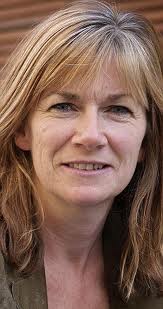 THERE’S something that professional musicians sometimes describe as “the tyranny of the dots”, and I was reminded of it during Nell Leyshon’s multi-layered play, Folk, now on at Hampstead Theatre Studio.
THERE’S something that professional musicians sometimes describe as “the tyranny of the dots”, and I was reminded of it during Nell Leyshon’s multi-layered play, Folk, now on at Hampstead Theatre Studio.
Set, as is so much of Leyshon’s best work, in her native Somerset, it centres on the lives of two sisters. One of them, Louie, is slightly crippled and a bit slow but possessed of an innate love and understanding of music. All the songs she learned from her mother are imprinted in her memory and in her soul.
When classically-trained London academic Cecil Sharp arrives to “collect” songs, in an expressed effort to save the music of England, he is transfixed by her singing and her embodiment of the spirit of the songs. He writes them down, both their lyrics and the notes. She can read neither. He leaves, promising that her songs will inspire his own compositions.
But, discovering his own talents to be insignificant, he “arranges” Louie’s songs with what he regards as suitable orchestration for the time, engages a professional singer and holds a hugely successful soiree at the conservatoire he runs in the capital. He publishes the songs and his arrangements, under his own name.
Back in Somerset, Louie’s delight at his return is fast followed by disappointment and anger that her mother’s songs have been commandeered and claimed without permission, and quickly realises that the soul of the songs, their rhythms and their meanings, has been lost.
 Some reviewers of Nell Leyshon’s play have viewed it from the prevailing angle of “cultural appropriation” but it is about MUCH more than that. It is set in 1903, in Hambridge, where Sharp was visiting his friend, the Rev Charles Marson, and woke up one morning to hear the gardener singing. This was just at the time when mechanisation was taking over the livelihoods of the rural poor. Louie and her sister Lucy were gloving outworkers, toiling on their gloving donkeys to finish the gloves from the skins cut and sent from the tannery.
Some reviewers of Nell Leyshon’s play have viewed it from the prevailing angle of “cultural appropriation” but it is about MUCH more than that. It is set in 1903, in Hambridge, where Sharp was visiting his friend, the Rev Charles Marson, and woke up one morning to hear the gardener singing. This was just at the time when mechanisation was taking over the livelihoods of the rural poor. Louie and her sister Lucy were gloving outworkers, toiling on their gloving donkeys to finish the gloves from the skins cut and sent from the tannery.
Sharp, determined to establish an English Musical Tradition, could not have been more delighted that the gardener’s name was John England. He was singing The Seeds of Love, famously the first song that Sharp “collected.” But John had to choose between menial work at the tannery and a future in the New World. Before long, mechanised farm machinery would mean that the field workers’ work songs would no longer be needed.
Louie’s heartfelt plea for the organic nature of the songs to be preserved, to be developed by their singers, was doomed. Without the involvement of Cecil Sharp, known as the father of the English folksong revival, many of the songs would have been lost forever.
The playwright has created a lyrical, poignant and powerful story around the lives of the urbane Sharp, played with steel, charm and enthusiasm by Simon Robson, the ambitiously callous John (Ben Allen) and sisters Louie (Mariam Haque) and Lucy (Sasha Frost.)
Mariam Haque’s mesmerising performance captures the certainty, passion, grief and pure musicality of Louie Hooper, the heart of Folk. Her extraordinary intensity, closing her eyes to block out irrelevant sounds, weaving her agile hands in agony, joy and recollection of the physical locations of the music she carries, is a wonder.
Sasha Frost’s Lucy is a scornful older sister, holding back her own mourning for the sake of her little sister and their lives together, balanced on the breadline.
This was a Somerset that is still just visible to locals, and the writer has captured (again) its essence, at the same time as introducing the audience to some of Hooper’s songs, performed by all the cast as well as= by Mariam Haque as solos.
Folk is sold out at the Hampstead Studio, where it runs until early February. There are plans for a transfer to a larger theatre, and/or a tour. Let’s hope that it comes home and our readers get the chance to see it at a theatre in the South West.
GP-W